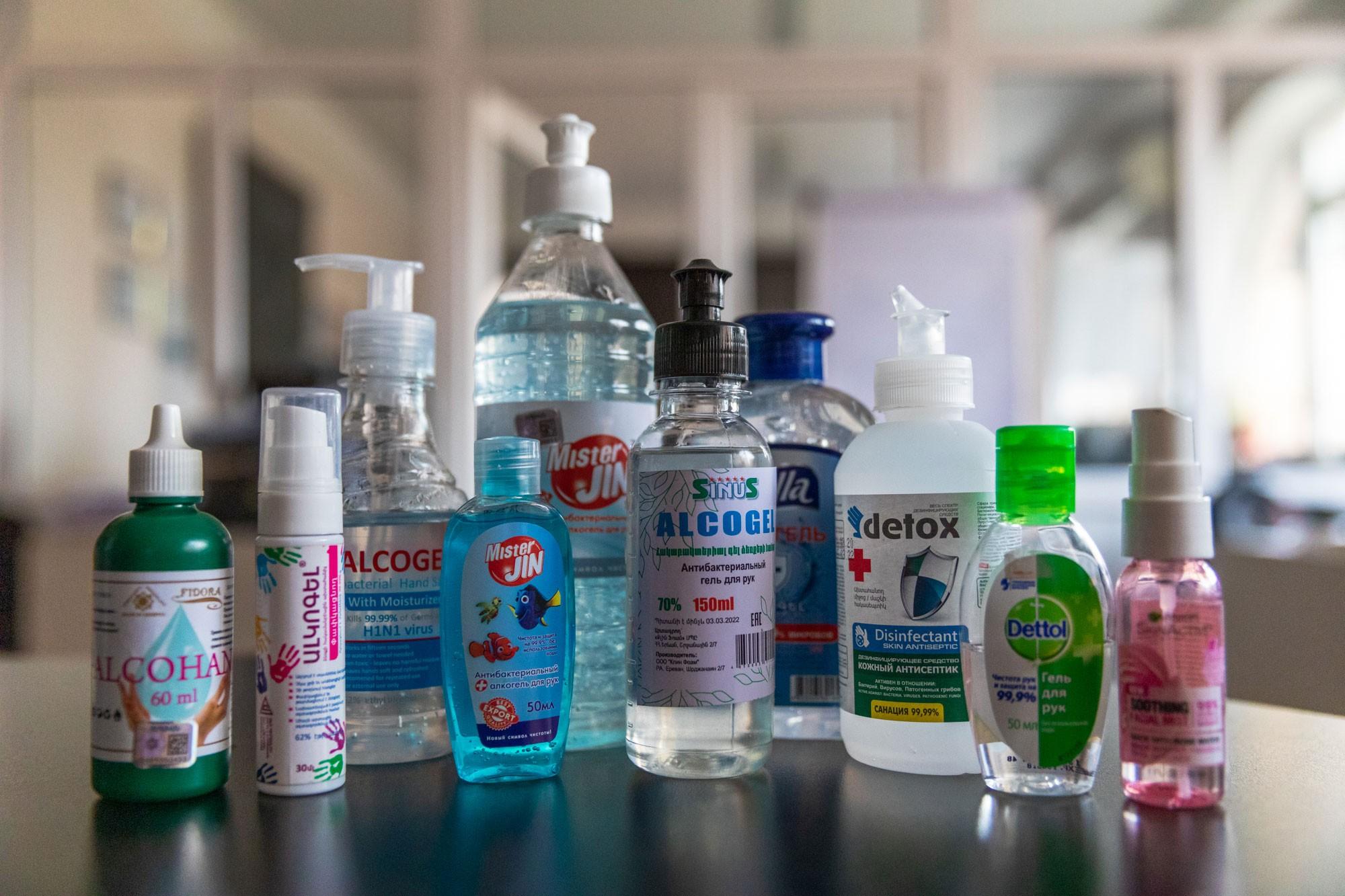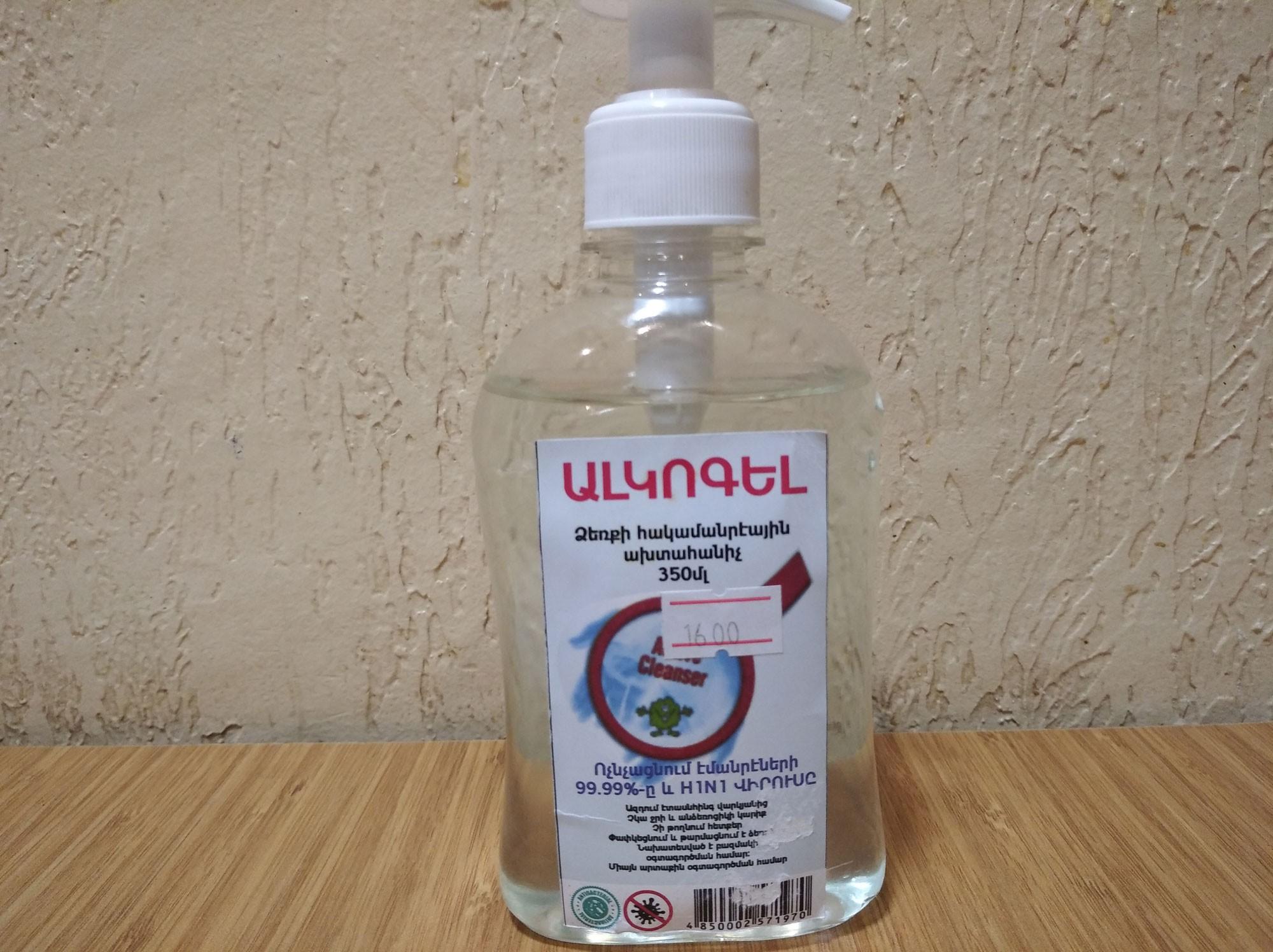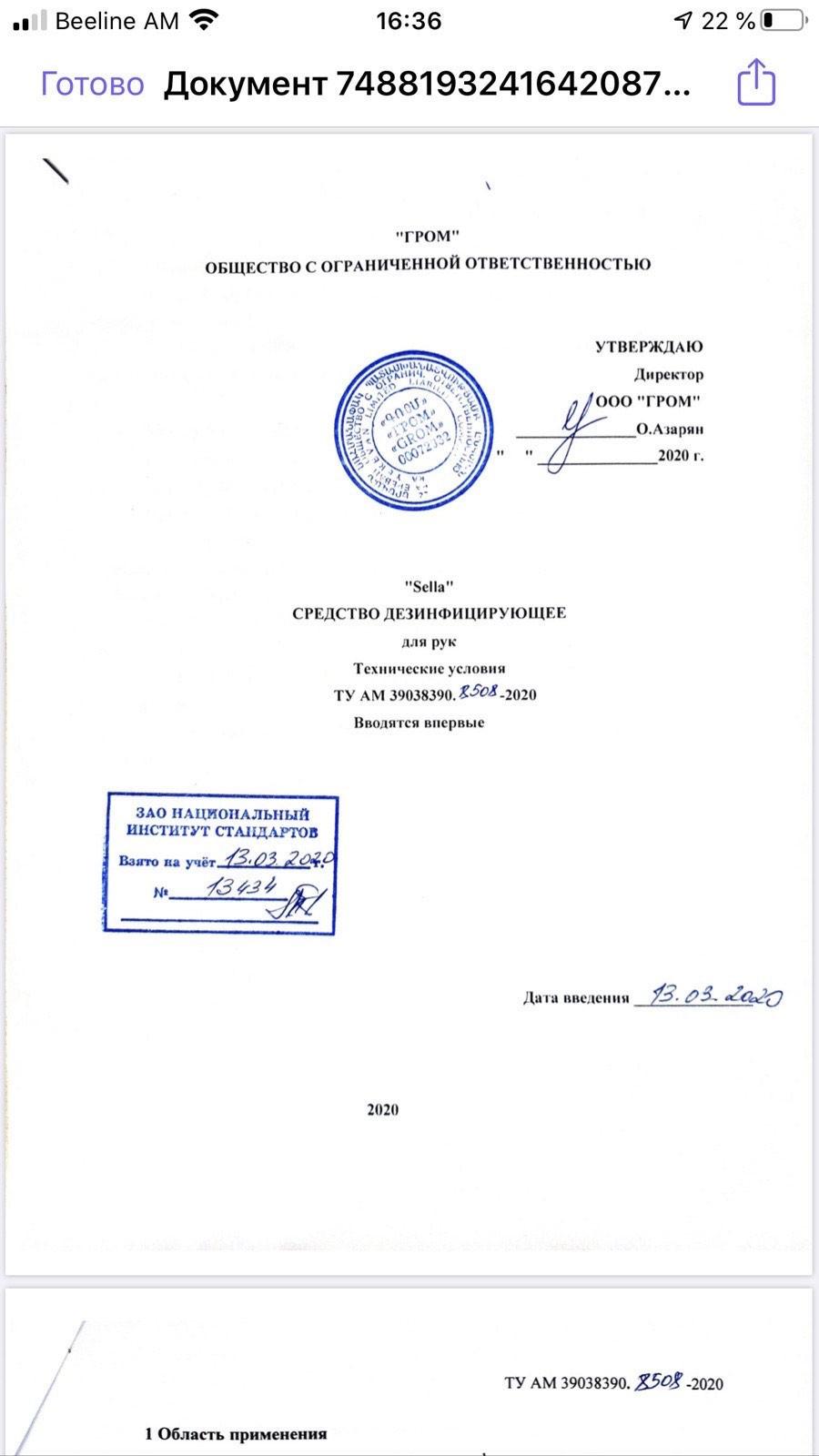
Navigating Armenia’s Hand Sanitizer Market: 11 Newly Registered Producers, but No Monitoring of Quantity or Ingredients
The number of manufacturers of hand sanitizers has increased dramatically in Armenia due to the spread of coronavirus infection, but their market prices have not significantly changed. It also turns out that there is no monitoring of their sale.
In response to our inquiry, Head of Armenia's Market Surveillance Inspection Body (MSIB) Armen Kotolyan stated that hand-made antimicrobial disinfectants are not on the list of products subject to market monitoring.
Kotolyan cited the government’s decision of August 9, 2012 "On the Approval of the Procedure for Submission of Information on Products Subject to Mandatory Conformity as Provided by the Customs Regulations and the Annulment of the Decision of the Government of the Republic of Armenia of July 21, 2011".
On March 14, the State Commission for the Protection of Economic Competition (SCPEC) reported that three local companies are producing antimicrobial disinfectants. They are Arts Cosmetics LLC (trademark “Lina”), Arsanit LLC (trademark "Alcogel"), and Ecoform LLC (trademark “Mister Jin”). However, at today's government cabinet session, SCPEC Chairman Gegham Gevorgyan announced that five companies are producing alcogel.
In fact, the list of manufacturers of alco-gel is much larger because several other companies have also introduced new alcogels to the market.
The MSIB does not have information as to their quality or composition, whether they meet established standards, or if the alcogels on the market have proper certification.
During a press conference on March 14, the SCPEC also reported that daily production of antimicrobial disinfectants in Armenia amounts to about 6-7 tons. Wholesale prices of antimicrobial disinfectants by manufacturers have not increased.
At a March 17 press conference, SCPEC Chairman Gevorgyan said there was no price increase at the three major companies producing alcogel.
“They didn't raise the price of the product with any currency. In Armenia, the supply of alcohol is also adequate, and its price has not gone up either. It was the same price three months ago in major commercial networks. It’s the same today,” Gevorgyan said.
On March 18, Armenian Prime Minister Nikol Pashinyan, via a live Facebook post, spoke about quantity of alcogel and alcohol production in Armenia, claiming they were produced in sufficient quantities.
“In Armenia, 11,000 liters of alcohol is processed daily. A half goes to alco-gel production. There is a local producer. Production is at full capacity, and the alco-gel shortage, we can say, is a panic deficit. There are three companies that produce, and we have information that in the coming days a fourth company will also be added.
The SCPEC Chairman and Prime Minister Nikol Pashinyan perhaps mean big producers, referring to three or four companies. But there are other producers in the market as well. In addition, new manufacturers have appeared in the market that do not even list the composition of their disinfectants.
During our inspections of shops and pharmacies in Yerevan, we came across several companies producing hand sanitizers. The list included Grom LLC, Van Charter, Grigor Yeghiazaryan, Clean Foam, Fidora Ltd., Household Chemical Plant LLC, ESCO-PHARM LLC. We talked to some of them.
Arsanit LLC is the oldest manufacturer of disinfectants. It has been operating since 1995. It is involved in the production and wholesale of gel and liquid medicine. Wholesale prices of “Alcogel" by Arsanit LLC differ little than previous prices, but retail prices in pharmacies have increased slightly. We were unable to get in touch with the company because there was no phone number on the company’s website.
Arts Cosmetics LLC has been around since 2000. Prior to spreading the novel coronavirus in Armenia, the company produced a small amount of alcogel and that was based on specific orders.
“For some institutions, we have produced small quantities on orders they submitted. I have a certificate to produce this product, but I did not produce it because it was not selling,” says company director Arthur Melkonyan.
He noted that company has ramped up production of alcogel since March 1. They produce 1.5-2 tons of hand sanitizer daily under the “Lina” brand name "Lina”. Melkonyan says that despite the great demand, the company has not changed the wholesale price of the product - the price of 350 ml is 800 AMD, excluding VAT.
The company has no problem with raw material supply, but in the event of a shortage they are thinking of importing material from Russia. Melkonyan says the government is aware of the volume and price of products daily. "Every day they call me and check how much we have distributed to the chains, how much we have sold, and what the prices are,” says Melkonyan.
Ecoform LLC's hand antibacterial gel sold under the name Mister Jin. The company was registered in 2016. Ecoform LLC is in the business of producing plastic containers, household chemicals, and the import and sale of building materials.
In the past, the company also produced a spirit-based microbial gel, and according to its founder, director Vardan Badalyan, it has the necessary certification. Now they produce more of it.
“The company has not changed its prices at all. The prices of one and two years ago remain the same now. Especially for all government agencies, the company supplies it on a special basis, with a special discount,” Badalyan says.
He declined to say how many tons of bacterial gels are produced daily. As to whether the company has raw material problem, Badalyan replied: "We are working, and the company is delivering on a regular basis." The price of 500ml of the company's product in the ERMEL store chain is 1,600 AMD.
Established in 2008, Van Charter also manufactures hand sanitizers. The company's Facebook page says that the Caleus alcogel brand costs 900 drams for 250 ml. We contacted the company, trying to find out when they began producing alcogel, the quantity, and whether they had a certificate to produce moisturizing alcogel, but a company representative named Mary said she had no time to answer our questions.
Grigor Yeghiazaryan has been producing alcogel for about 20 days. Yeghiazaryan told Hetq that in the past they had only produced small quantities on order or for personal use. I was never sold in stores. Now, because of the demand, they are also trying to produce for the market.
"There is a lot of demand now, but I can't technically produce much. My production is not great, and I can't supply in quantity," says Grigor Yeghiazaryan. They can produce 200-300 liters a day, bottling them in different sized containers.
Yeghiazaryan says there has been no price change. He assured us that they have a certificate to manufacture alcogel, which they received from the National Institute of Standards.
"Household Chemical Factory" LLC was registered in 2015 (formerly "Household Chemical Factory" OJSC). It's been a month since it started producing Detox antiseptic skin disinfectant. The price of 250ml is 1,200 AMD in the Urartu chain of stores.
Company accountant Karineh said that years ago they stopped production but restarted a month ago and are still producing and selling at the same wholesale price.
Aloe ArmLab LLC, the owner of aloe developer and grower Aloe Lab, started producing disinfectant containing aloe three days ago. “We produce alcogel by using aloe gel. We get wholesale certified alcohol, add our aloe gel, pack it up and sell it, "said Aloe Lab Manager Karapet Avagyan. They produce 50-70 liters a day.
"We have been producing it for two days at the same price. We have fixed prices, and we give a 20% discount to those companies that buy it from us wholesale," Avagyan said. 100 ml of this company’s disinfectant gel is sold for 1,450 AMD.
A bottle of Clean Foam’s alcogel we obtained at a downtown Yerevan drugstore lacked a list of ingredients. Only the manufacturer's name and address were affixed.
The company was registered in 2014. David Petrosyan owns the company and serves as director. He told Hetq that the company used to produced detergents, but due to the spread of coronavirus, also started producing alcogel this week, noting the demand.
The company produces household sanitary and hygiene products. They are also supplied by government agencies to some state agencies. In 2019, the company signed three contracts with the Ministry of Emergency Situations. The company also supplied liquid soaps and detergents (Sinus brand) to the Yerevan State Medical University. “Alcogel” is also produced under the same brand name "Sinus".
David Petrosyan says the company already has a raw material problem to produce alcogel. The company used to purchase 1 kg of alcohol for 900 drams, but now it increased to more than 2,000 drams. The cheapest supplier was Unicom, but it too is out of alcohol.
"Today we are on the verge of shutting down because there is no alcohol. The price of straight alcohol has tripled. We cannot find it, and at such high prices it makes no sense to sell 100ml of alcohol for 1,000 drams. Now they can’t produce enough bottles as well. Everything is a problem. We do what we can,” Petrosyan says.
He assured us that the product is certified and that they had just begun to produce. He said the lack of ingredients on some bottles is due to the haste to prepare and market them. “There came a time when we attached a label to one bottle and missed another. This is the first time I’ve slept in three days. This is the situation we’re in. But we took them to the laboratory and got them checked. They saw the stuff is safe and issued new certificates. Afterwards, we marketed the product,” Petrosyan says.
Fidora LLC is one of the smaller companies producing hand care products. It was founded in 2007. It is mainly engaged in the production of vegetable oils and ointments. Lusineh, who introduced herself as a company manager, told Hetq that they also manufactured a 30ml anti-bacterial care product under the “Lilit” brand name.
"Due to this demand we decided to produce the same ingredient called ALCOHAND to make people more aware that it is a disinfectant," Lusineh said.
The wholesale price of 100ml hand sanitizer is 500 AMD. The product can be found in all pharmacies or can be ordered through the company's Facebook page at 80 AMD for 100ml, including shipping. Lusineh told us that because of the large demand they are not able to deliver and can barely produce. The company still has no problem with raw materials, but if sales continue at present levels, there will be a bottleneck. "We got a call from the government staff. We are always in touch with them. We told them about the bottles issue and that we want to import bottles," Lusineh added.
She could not say how many liters a day they were delivering to the outlets. "Let's say the size of the last shipped product was probably 1,000 60ml units, 600 100ml units, and 500-600 310ml units.”
The next company that produces hand-made antimicrobial disinfectant alcohol is GROM LLC. It has been operating since 2002. The company produces cleaning products, shampoos, soaps and other materials. However, there are no hand sanitizers in the site product directory. We found the Sella brand alcogel produced by this company in the Ermiel chain of stores for 330 ml at 890 AMD. Apparently, the company has also just started to produce alcogel. The phone number listed on the company website was out of order or inaccessible.
One of our readers handed us an antimicrobial hand sanitizer called Alcogel, purchased from a drugstore in the town of Sevan. The label lacks the manufacturer’s name and a list of ingredients. There are grammatical errors and typos on the label. The product resembles a liquid than a gel. The container was heavily scratched, implying it had been used more than once. 350ml of this antimicrobial disinfectant of unknown origin was sold at the pharmacy for 1,600 AMD.

Artak Shahbazyan, Deputy Director of the National Institute of Standards, the agency that coordinates the certification process, told Hetq that alcogel doesn’t require certification if only to be used as a disinfectant. However, if it is both a disinfectant and moisturizer, which is considered a cosmetic agent, then certification must be carried out according to Customs Union technical procedure.
“Not only alcogel, but also other disinfectants, for toilets and such, are not certified. Most hand disinfectants are subject to certification,” Shahbazyan says.
The National Institute of Standards doesn’t know how many companies are certified to produce alcogel hand sanitizers since there are many private companies permitted to issue certification.
“There are 15-20 certification bodies like us. We’re not the only one issuing certification. We are not like the Food Safety Inspectorate, which is the only one in the republic. As an institute of standards, we are the only one, but we are not the only one doing certification. There are 20-30 organizations that have received permission to certify and are doing so,” Shaboyan said.
In order to know if a hand sanitizer is certified, consumers must ask the seller. The seller, in turn, is required to produce a declaration of conformity, as in the case of other products subject to mandatory certification. "The consumer can demand, and they have to submit a declaration of conformity," Shaboyan said.
In pharmacies and stores we visited we tried to find out if the alcogel being sold had certification. No store or pharmacy we visited in downtown Yerevan had a certificate to sell the alcogel. Only one of the shops of Urartu chain, after a call from the manager, did the company send a declaration of a seal approved by the National Institute of Standards on March 13 to GROM LLC.
Video by Ani Sargsyan
Information on the holders of alcogel certification is in the Customs Union registry maintained by the National Accreditation Agency SNCO. This body authorizes all accreditation bodies and authorizes them to carry out certification. Therefore, it also collects related information.
More suspect are online announcements of alcohol sales. There is a large supply of alcogels on offer in the well-known list.am domain. From conversations with several of them, we found out that not only do they not know or disclose the company names, but that they cannot provide proper paperwork upon order.
Ani Obosyan, Director of National Accreditation Authority SNCO, in response to our verbal inquiry about which companies have production certificates for alcogel, provided a single registry of compliance certificates and registered conformity declarations issued by the Customs Union. According to the report, only 11 applications for alcogel were registered this month, with 4 more in 2018. In addition, Ani Obosyan said that the registry contains hundreds of cosmetic declarations, which may include disinfectants, which can be found on the SNCO's official website.
Only four of the manufacturers mentioned in this article are on the SNCO list.
And on the SNCO website we didn't find:
- Certificate of production of "Grigor Yeghiazaryan" Alcogel,
The company has filed a statement on "Liquid Soap and Nail Polish for Aroma Lux" brand,
- "Appropriate Certificate of the Household Chemistry Factory"
The "Household Chemistry Factory" has a certificate to produce nail polish remover, as well as to produce liquid detergent under the brand "Detox", but not for alcogel or antiseptic skin disinfectant,
- Certificate of "Fidora" LLC- the company has a certificate to produce hand soap,
- Certificate of "GROM" LLC ․
We found on the SNCO website only a statement on the production of liquid soap under the brand Sella, as well as a statement on some other cosmetic items. When we asked for a certificate in the Urartu chain of stores, the following document was sent to the manager.

As to how many other companies can take advantage of this opportunity to market their products without proper disclosure is unknown as the market control body does not deal with these products.
Taking all of this into account, one can assume that anyone can take advantage of the situation and make gels in their basement and market them; even gels that contain no disinfectant. Therefore, buyers at the point of sale must request the product's certificate / certificate and then make the purchase. And sales outlets should ask the manufacturers and have copies of declarations.
 Videos
Videos Photos
Photos
Write a comment